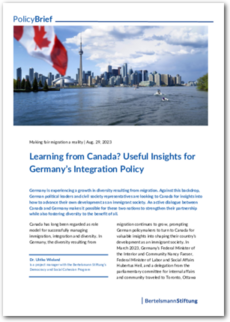With its origins in settler colonialism, Canada has fundamentally embodied an immigrant society since its early days as a modern nation in the 19th century. For a long time, the nation’s immigration policies were profoundly influenced by ethnic and cultural considerations. It wasn’t until the 1960s that the country introduced radical changes to its immigration policy that were driven by both normative values and economic factors. Since then, the policy has shifted toward economic criteria, largely disconnected from an individual’s place of origin. This transition was accompanied by the adoption of an official multiculturalism policy, aimed at acknowledging diverse cultural identities and ensuring inclusive well-being.
Today, the Canadian government is targeting record-breaking levels in immigration. In 2022, over 437,000 individuals elected Canada as their new residence, with India, China and Afghanistan being the primary countries of origin. Notably, public support for the current immigration policy has reached unprecedented heights, as seven out of ten Canadians stand behind the current approach to immigration.
![[Translate to English:] Man die Skyline von Toronto vom Wasser aus. Im Vordergrund die Flagge von Kanada](/fileadmin/files/_processed_/2/8/csm_AdobeStock_120912684_KONZERN_ST-DZ_01_6d0cefe6d6.jpg)


![[Translate to English:] Drei Menschen mit Maske blicken in eine Richtung](/fileadmin/files/_processed_/5/5/csm_1621133995AdobeStock_361885051_KONZERN_ST-LW_a528f95131.jpg)


